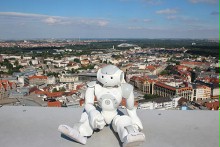Focus on the future: Robots are taking over Leipzig

It is a meeting of high-performance robots and the innovative and intelligent minds behind them: Starting tomorrow until 4 July, the 20th RoboCup will be held on the Leipzig exhibition grounds. The world championships of intelligent robots combine top scientific achievements with practical aspects, and in the process show us how we can address society's future challenges. RoboCup is accompanied by a concurrent MINT and recruiting exhibition, as well as an extensive technical program.
Soccer, Rescue, Industrial & Home: Competitions in more than 17 disciplines
Young scientists, Ph.D. students and professors will be competing in the RoboCup Major category. Soccer-playing robots are at the center of these competitions. In eight different disciplines – a distinction is made according to hardware and software – autonomous robots will be kicking the ball across the field. Three other disciplines focus on application scenarios. As part of RoboCup@Home, robots demonstrate how they can help with household tasks, while robots in RoboCup Rescue conduct a search mission on a rescue course, and yet other robots optimize work and logistics processes in RoboCup Industrial.
RoboCup Junior has some challenges in store for young science talent. Students up to 20 years of age use their robots to play soccer, present a choreography or master a rescue course, just like their older counterparts.
Vision for 2050: Soccer match against the reigning FIFA World Champion
Thus it is no wonder that the RoboCup Community has come up with such an ambitious and exciting vision for the competition. In 2050, a team of autonomous humanoid robots wants to play against and beat the reigning FIFA World Champion.
Even if this goal still seems far off in the distance, the successes achieved by RoboCup nevertheless give credence to this ambitious claim. The rescue robot league, for example, was introduced in 2001 in response to the large earthquake in Kobe (Japan), in order to promote research in this field. The Quince robot, which was designed for this purpose, was used at the damaged Fukushima nuclear power plant as one of only a few robot systems. In another example, the basic technology of Kiva Systems, which was originally developed in the Small Size League, became a business success, as the company was bought by Amazon for more than $ 700 million.
The red-hot topic of Industry 4.0 has also been addressed by RoboCup for a number of years. Development engineers at many large manufacturers are interested in combining industrial production methods with modern information and communication technology. Therefore it is only logical that the RoboCup Logistics League and RoboCup@Work will be bundled under RoboCup Industrial, to ensure that research activities for industrial applications are driven forward even more efficiently. A series of exciting competitions focuses mostly on examining and continually improving unsolved research questions that form the basis of logistics processes and flexible production flows in factories.
- HTML

